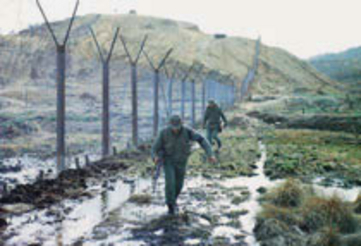 It’s possible exposure occured in other periods. See the 2011 VA Final Rule Here. It states:”If VA receives evidence that herbicides were used in or near the DMZ from an earlier date, VA may rely on that information in individual cases and may revise the presumption as necessary.”In total, many thousands of GIs who served in Korea may have suffered exposure to Agent Orange. Depending on circumstances, treatment and/or disability payments for Agent Orange diseases are available to Korean Service veterans, their wives and husbands, children and/or parents.
It’s possible exposure occured in other periods. See the 2011 VA Final Rule Here. It states:”If VA receives evidence that herbicides were used in or near the DMZ from an earlier date, VA may rely on that information in individual cases and may revise the presumption as necessary.”In total, many thousands of GIs who served in Korea may have suffered exposure to Agent Orange. Depending on circumstances, treatment and/or disability payments for Agent Orange diseases are available to Korean Service veterans, their wives and husbands, children and/or parents.
What is Agent Orange Disease?
Acccording to the VA, a number of different types of diseases are associated with exposure to Agent Orange (Lou Gehrig’s Disease that a vet develops after 90 days or more of continuous service is assumed to be service related, even though the disease is not believed to be caused by Agent Orange). The follow list includes those diseases, including ones vets may call “Agent Orange cancers,” “Agent Orange heart disease,”and “Agent Orange prostate cancer:”
§ AL Amyloidosis
A rare disease caused when an abnormal protein, amyloid, enters tissues or organs
§ Chronic B-cell Leukemias
A type of cancer which affects white blood cells
§ Chloracne (or similar acneform disease)
A skin condition that occurs soon after exposure to chemicals and looks like common forms of acne seen in teenagers. Under VA’s rating regulations, it must be at least 10 percent disabling within one year of exposure to herbicides.
§ Diabetes Mellitus Type 2
A disease characterized by high blood sugar levels resulting from the body’s inability to respond properly to the hormone insulin
§ Hodgkin’s Disease
A malignant lymphoma (cancer) characterized by progressive enlargement of the lymph nodes, liver, and spleen, and by progressive anemia
§ Ischemic Heart Disease
A disease characterized by a reduced supply of blood to the heart, that leads to chest pain
§ Multiple Myeloma
A cancer of plasma cells, a type of white blood cell in bone marrow
§ Non-Hodgkin’s Lymphoma
A group of cancers that affect the lymph glands and other lymphatic tissue
§ Parkinson’s Disease
A progressive disorder of the nervous system that affects muscle movement
§ Peripheral Neuropathy, Acute and Subacute
A nervous system condition that causes numbness, tingling, and motor weakness. Currently, it must be at least 10 percent disabling within one year of herbicide exposure and resolve within two years. VA proposed on Aug. 10, 2012, to replace “acute and subacute” with “early-onset” and eliminate the requirement that symptoms resolve within two years.
§ Porphyria Cutanea Tarda
A disorder characterized by liver dysfunction and by thinning and blistering of the skin in sun-exposed areas. Under VA’s rating regulations, it must be at least 10 percent disabling within one year of exposure to herbicides.
§ Prostate Cancer
Cancer of the prostate; one of the most common cancers among men
§ Respiratory Cancers (includes lung cancer)
Cancers of the lung, larynx, trachea, and bronchus
§ Soft Tissue Sarcomas (other than osteosarcoma, chondrosarcoma, Kaposi’s sarcoma, or mesothelioma)
A group of different types of cancers in body tissues such as muscle, fat, blood and lymph vessels, and connective tissues
The ailments above are called “presumptive diseases,” meaning if you were in or near the DMZ during the designated times, it’s presumed you got sick from Agent Orange and you qualify for disability. If you have other types of diseases, you may have to prove you were exposed to Agent Orange/herbicides and it’s connected to your disease.
Birth Defects
Some types of birth defects may be assumed by the VA to be linked to Agent Orange explosure. This incudes Spina Bifida, an incomplete closing of the fetus’ spin, is one of them.
Apply Online
Free exam Health care benefits Disability compensation, Compensation, health care and vocational training for a child with a birth defect. Benefits for survivors (spouse, child, parents)
You can apply online: https://www.ebenefits.va.gov/ebenefits-portal/ebenefits.portal?_nfpb=true&_portlet.async=false&_pageLabel=ebenefits_myeb_vonapp1
C-123 Air Force Crews After ’71 May Have Been Exposed to Agent Orange

http://www.publichealth.va.gov/exposures/agentorange/residue-c123-aircraft.asp


How long does agent orange last? I was on the DMZ in 88 and 89.